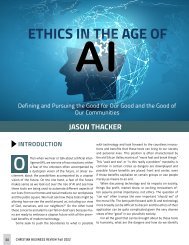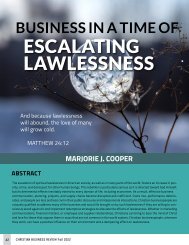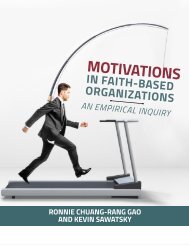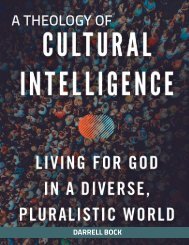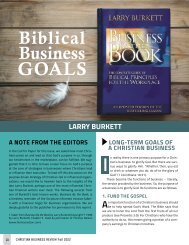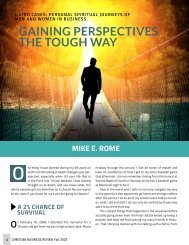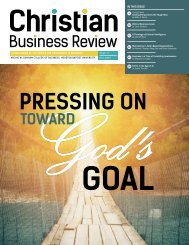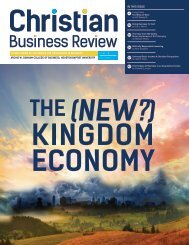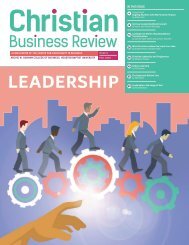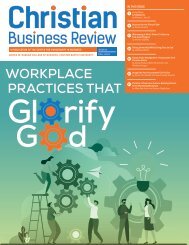Christian Business Review 2018: Kingdom Business in the Brave New World (Issue 7)
You also want an ePaper? Increase the reach of your titles
YUMPU automatically turns print PDFs into web optimized ePapers that Google loves.
artificial <strong>in</strong>telligence<br />
cbr articles<br />
A Stanford University research team concludes that artificial<br />
<strong>in</strong>telligence “now seems poised to automate many<br />
tasks once thought to be out of reach, from driv<strong>in</strong>g cars to<br />
mak<strong>in</strong>g medical recommendations and beyond.” 3<br />
Cyber-futurist Ray Kurzweil believes that by 2029<br />
<strong>the</strong>re will be “almost no human employment <strong>in</strong> production,<br />
agriculture,<br />
corporate culture, and <strong>the</strong> quality of <strong>the</strong> workplace itself<br />
for <strong>the</strong> humans who rema<strong>in</strong>.<br />
And what about those men and women who see <strong>the</strong>ir<br />
work, not merely as an occupation, but as a God-given<br />
vocation? Will <strong>the</strong> AI “<strong>in</strong>vasion” of <strong>the</strong> workplace deprive<br />
<strong>in</strong>dividuals of <strong>the</strong>ir purpose and push <strong>the</strong>m out of what<br />
<strong>the</strong>y feel to be <strong>the</strong>ir<br />
places of m<strong>in</strong>istry?<br />
To separate div<strong>in</strong>e revelation from<br />
human <strong>in</strong>ventiveness is to walk on<br />
<strong>the</strong> precipice of a perilous divide.<br />
and transformation.”<br />
Education<br />
will be <strong>the</strong> “largest<br />
profession,”<br />
and <strong>the</strong>re will<br />
be “many more<br />
lawyers than doctors.” 4<br />
Yet not all <strong>the</strong> data are grim. A report by <strong>the</strong> International<br />
Bar Association (IBA) Global Employment Institute<br />
notes that some studies show that jobs elim<strong>in</strong>ated by AI<br />
“will be compensated for, more or less, by newly created<br />
jobs.” A German study, for example, suggests that automation<br />
will result <strong>in</strong> 390,000 new jobs <strong>in</strong> <strong>the</strong> “third sector”<br />
(low paid jobs) over a ten-year period. 5 In fact, <strong>the</strong> IBA<br />
report quotes f<strong>in</strong>d<strong>in</strong>gs that <strong>the</strong> creation of “one high-tech<br />
job will create between 2.5 to 4.4 o<strong>the</strong>r jobs <strong>in</strong> <strong>the</strong> local<br />
area, mostly <strong>in</strong> low-skilled and medium-skilled <strong>in</strong>-person<br />
services.” 6 These non-rout<strong>in</strong>e manual occupations are service<br />
jobs, such as janitors, gardeners, manicurists or home<br />
health aides.<br />
Louis Monier, founder of <strong>the</strong> AltaVista search eng<strong>in</strong>e,<br />
actually sees benefit <strong>in</strong> <strong>the</strong> loss of jobs. Monier has no<br />
ethical qualms about it, he told an <strong>in</strong>terviewer for Tech<br />
Republic. The employment that AI will destroy are <strong>the</strong> jobs<br />
people would not choose “because of passion or a sense<br />
of mission,” but are simply means of “putt<strong>in</strong>g food on <strong>the</strong><br />
table.” The jobs that will outlast <strong>the</strong> AI onslaught “will be<br />
ei<strong>the</strong>r creative, or require a human touch,” enabl<strong>in</strong>g workers<br />
“to decouple mak<strong>in</strong>g a liv<strong>in</strong>g from a job.” 7<br />
Ironically, <strong>the</strong> IBA f<strong>in</strong>ds that just about every job<br />
“where an employee sits <strong>in</strong> front of a computer screen<br />
and processes and <strong>in</strong>terprets data is at high risk.” 8 These<br />
are jobs that require check<strong>in</strong>g, analyz<strong>in</strong>g, and process<strong>in</strong>g<br />
data—all of which will be done eventually by artificial<br />
<strong>in</strong>telligence. It’s no surprise that <strong>the</strong> “greatest boom” <strong>in</strong><br />
employment <strong>in</strong> <strong>the</strong> decade ahead will be <strong>in</strong> <strong>the</strong> IT service<br />
sector. 9 Yet <strong>the</strong> IBA report anticipates that from 2017-<br />
2027, some seven million jobs will be elim<strong>in</strong>ated because<br />
of AI, and two million created, leav<strong>in</strong>g a job deficit of five<br />
million. The “<strong>in</strong>tegration” of five million people look<strong>in</strong>g<br />
for jobs <strong>in</strong>to <strong>the</strong> new labor configuration result<strong>in</strong>g from<br />
AI “is <strong>the</strong> greatest challenge for governments, employee<br />
representatives, and companies.” 10<br />
Much has been written about <strong>the</strong> quantitative benefits<br />
of AI—greater productivity, reduction of conflict<br />
between workers, elim<strong>in</strong>ation of costly benefit packages,<br />
absenteeism, turn-over, to name a few. But what about <strong>the</strong><br />
qualitative? We are not speak<strong>in</strong>g here merely of enhanced<br />
quality <strong>in</strong> products and services, but <strong>the</strong> impact of AI on<br />
As advanced<br />
societies rush on<br />
<strong>the</strong> journey of AI<br />
development and<br />
expanded use, <strong>the</strong>re<br />
are important pr<strong>in</strong>ciples that can help companies ma<strong>in</strong>ta<strong>in</strong><br />
<strong>the</strong> vital balances that help make AI a tool ra<strong>the</strong>r than<br />
a master. Here we consider seven pr<strong>in</strong>ciples for healthy<br />
deployment of AI <strong>in</strong> <strong>the</strong> workplace:<br />
Pr<strong>in</strong>ciples for Healthy AI – A <strong>Christian</strong><br />
Perspective<br />
Immanence must not displace Transcendence.<br />
The transcendent and <strong>the</strong> immanent must be seen as a<br />
l<strong>in</strong>kage, not as two separate, compet<strong>in</strong>g dimensions. Mart<strong>in</strong><br />
Lu<strong>the</strong>r’s reforms led ultimately to a fresh understand<strong>in</strong>g<br />
of <strong>the</strong> importance of <strong>the</strong> transcendence-immanence<br />
union. Lu<strong>the</strong>r’s thought spurred o<strong>the</strong>r sixteenth century<br />
reformers “to recover <strong>the</strong> Biblical doctr<strong>in</strong>e of work.” 11<br />
However, artificial <strong>in</strong>telligence is be<strong>in</strong>g developed <strong>in</strong><br />
an era of <strong>the</strong> fad<strong>in</strong>g of <strong>the</strong> sense of <strong>the</strong> Transcendent. As<br />
<strong>in</strong> <strong>the</strong> Ages of Enlightenment and Reason, <strong>the</strong> boundaries<br />
provided by a healthy regard for Transcendent Authority<br />
are giv<strong>in</strong>g way to <strong>the</strong> onslaughts of utilitarianism on one<br />
hand, and idealistic romanticism on <strong>the</strong> o<strong>the</strong>r.<br />
As <strong>the</strong> world of work becomes <strong>in</strong>creas<strong>in</strong>gly a cyberdoma<strong>in</strong><br />
it is vital to ma<strong>in</strong>ta<strong>in</strong> <strong>the</strong> l<strong>in</strong>k between spiritual<br />
values and technological complexity. To separate div<strong>in</strong>e<br />
revelation from human <strong>in</strong>ventiveness is to walk on <strong>the</strong><br />
precipice of a perilous divide. The transcendent and <strong>the</strong><br />
immanent must be seen as a l<strong>in</strong>kage, not as two separate,<br />
compet<strong>in</strong>g dimensions. Mart<strong>in</strong> Lu<strong>the</strong>r’s reforms led ultimately<br />
to a fresh understand<strong>in</strong>g of <strong>the</strong> importance of <strong>the</strong><br />
transcendence-immanence union, and ultimately to <strong>the</strong><br />
possibility of recover<strong>in</strong>g a biblical vision for work and <strong>the</strong><br />
workplace.<br />
Information must not trump wisdom<br />
“Get wisdom,” <strong>the</strong> admonition of Proverbs 4:5-9, has been<br />
replaced by “get data” <strong>in</strong> <strong>the</strong> cyber-dom<strong>in</strong>ated world of<br />
work and relationship. This is driven partly by two factors<br />
forced upon bus<strong>in</strong>esses and <strong>the</strong> people who lead and operate<br />
<strong>the</strong>m by <strong>the</strong> <strong>in</strong>ternet: (1) <strong>the</strong> enormity of data, and<br />
8<br />
CHRISTIAN BUSINESS REVIEW Fall <strong>2018</strong>




